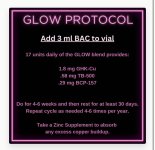Angiogenesis and VEGF are well known factors for increasing tumor growth rates. There is no real debate in the science about this, to the point that anti-VEGF/angiogenesis therapies are a current hotbed of research for cancer treatment.
BPC-157 and TB-500 promote angiogenesis and increased VEGF levels - these are some of their primary mechanisms for their benefits.
Either they do the things we are taking them for and we know they can almost certainly increase tumor growth rates, or they don't do them and there's significantly less reason to take them.
For TB4/TB500 specifically:
Thymosin β(4) (Tβ(4)) overexpression increases cell migration and tumor metastasis. Hence, understanding the mechanism of cancer cell migration induced by Tβ(4) may provide means to inhibit their metastasis. We demonstrated higher Rac1 activities and expression levels of IQGAP1 and ILK in highly...

pubmed.ncbi.nlm.nih.gov
Thymosin β4 is a multi-functional hormone-like polypeptide, being involved in cell migration, angiogenesis, and tumor metastasis. This study was undertaken to clarify the clinicopathologic implications of thymosin β4 expression in human colorectal ...

pmc.ncbi.nlm.nih.gov
Thymosin β4 (Tβ4), a 5 kDa protein, has been demonstrated to play an important role in a variety of biological activities, such as actin sequestering, cellular motility, migration, inflammation, and damage repair. Recently, several novel findings provided compelling evidence that Tβ4 played a...

pubmed.ncbi.nlm.nih.gov
General VEGF and cancer risks:
Metastasis is the leading cause of cancer-associated mortality and the underlying mechanisms of cancer metastasis remain elusive. Both blood and lymph…

www.sciencedirect.com
Cancer metastasis is responsible for a majority of the mortality in cancer patients and involves complex interactions, modulated by various factors and cytokines, between malignant and host cells. Vascular structures in solid tumors are crucial for ...

pmc.ncbi.nlm.nih.gov
Angiogenesis is a double-edged sword; it is a mechanism that defines the boundary between health and disease. In spite of its central role in physiolo…

www.sciencedirect.com
BPC-157 and angiogenesis:
Commonly, the angiogenic growth factors signify healing. However, gastrointestinal ulceration is still poorly understood particularly with respect to a general pharmacological/pathophysiological role of various angiogenic growth factors implemented in growth factors wound healing concept...
www.eurekaselect.com
Abstract BPC 157, a pentadecapeptide with extensive healing effects, has recently been suggested to contribute to angiogenesis. However, the underlying mechanism is not yet clear. The present study aimed to explore the potential therapeutic effect and pro-angiogenic mechanism of BPC 157. As...

link.springer.com
Angiogenesis and cancer growth:

www.sciencedirect.com
Tumor angiogenesis is necessary for the continued survival and development of tumor cells, and plays an important role in their growth, invasion, and metastasis. The tumor microenvironment—composed of tumor cells, surrounding cells, and secreted cytokines—provides a conducive environment for the...

jeccr.biomedcentral.com
A fact sheet that describes cancer-fighting agents that block the growth of blood vessels that support tumor growth.

www.cancer.gov
Sustained angiogenesis stands as a hallmark of cancer. The intricate vascular tumor microenvironment fuels cancer progression and metastasis, fosters therapy resistance, and facilitates immune evasion. Therapeutic strategies targeting tumor ...

pmc.ncbi.nlm.nih.gov
www.sciencedirect.com/science/article/pii/S2468294221001209
Angiogenesis is essential for tumor growth and metastasis. Antiangiogenic factor-targeting drugs have been approved as first line agents in a variety of onco...

www.frontiersin.org
We're unlikely to ever get large scale clinical trials for either of these. Working off of the data we do have is our best bet for making informed decisions about the safety of their use - and we know the mechanisms on which they operate, and we know these mechanisms are risk factors for accelerating tumor growth and metastasizing.
Is it possible there is some aspect to these compounds that ameliorate these risks somehow? Sure. It wouldn't be the first time that a compound subverts expectations around one of its mechanisms. But ignoring the mountain of evidence that some of the primary mechanisms these compounds operate on can turbocharge cancer growth rates in favor of hoping that somehow, they don't apply seems like sticking your head in the sand.
I'm not saying don't use them. I use them myself. But because I am informed of the likely risks, I am selective about when and for how long. Particularly when taking into account other risks factors, like increased IGF-1 from HGH use - another thing that can accelerate tumor growth if cancer is present.
Again, the claim isn't that they cause cancer - but that if you happen to have cancerous growth, they provide some of the very same conditions that these tumors need to grow rapidly.









